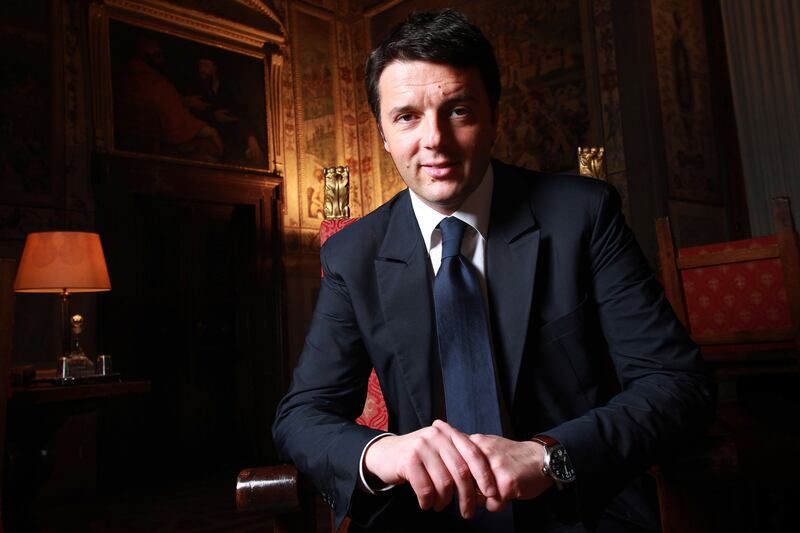Italy’s political stability has just gone from bad to worse. It has been almost six years since Italians have had a leader they actually voted for, and their next one will again be chosen by the president, not the people. In 2008, the last time the Italian populace managed to pull off a conclusive election, Silvio Berlusconi swept to power for what would end up being the fourth and final term of his long career. He was booted out of office in 2011 amid a maelstrom of corruption and sex scandals and replaced by technocrat Mario Monti, who lasted about a year before he, too, stepped down. After Monti’s short tenure, Italy held elections in February 2013—but they proved inconclusive (Monti ran but fared miserably) and, after weeks of political wrangling, Italian president Giorgio Napolitano tapped center-left moderate Enrico Letta to form a government last April.

For a period of time, Italians reveled in the fact that they had a leader who seemed normal. Where Monti had been dull and dreary, Letta was seen as a man of the people who famously shunned chauffeured cars, preferring to drive his Fiat station wagon to the presidential palace to accept the mandate to try to form a government.
For the last ten months, Letta has pulled off something of an equivalent to herding cats as he attempted, with some success, to guide a grand coalition of political enemies—including Berlusconi and protest movement leader Beppe Grillo and his “Grillini” or “little crickets”—to govern the country. This noble effort won Letta the flattering honor of having “balls of steel”. Still, he was unable to deliver on his promised reforms, and the country remained stuck. Youth unemployment hit an all time high of 41.6 percent under his leadership. Finally, on Thursday afternoon, Matteo Renzi, the charismatic 39-year-old mayor of Florence and new party leader of the center-left Democratic party, gave Letta the final push out of office. “The title of my adventure is ‘live each day as if it were the last,’” Letta told supporters just hours before he announced he would be resigning. Indeed, it was.
What’s next for Italy is likely more of the same with slightly different packaging. Renzi, at 39, will be Italy’s youngest-ever leader. He has never run in national elections and is not a member of parliament. “It’s time to crawl out of the swamp,” Renzi told Democratic party leaders before announcing he would pull his support from Letta, effectively pushing him out of office. “I’m running a crazy risk, but I have huge ambitions for Italy.”
On Thursday, he pulled up to Italy’s senate palace in a snappy Smart car, to the delight of the waiting press, who loved him as mayor of Florence but don’t know quite what to make of him yet as a political leader. He has been compared to Tony Blair and Bill Clinton for his political style. But he has also been dubbed “the Fonz” thanks to his penchant for t-shirts and leather jackets. When he announced his decision to take out Letta, he quoted Robert Frost, telling Italy “We are at a crossroads. I’m asking you to take the road less travelled.”
Some within and outside Renzi’s inner circle have criticized the young leader for acting too soon. He won with nearly 70 percent of the vote in a primary election to choose a new leader of the Democratic party last April. But like a child launching pebbles with a slingshot, he has been increasingly critical of Letta’s failures to boost the economy and create growth without actually calling for him to resign, prompting Letta to challenge him to show his cards and come clean with his intentions. “This is a very dangerous operation by Renzi for both the country and for himself,” said former adviser to Berlusconi Giovanni Toti on state-run RAI television Thursday night. “He was supposed to be an outsider who would breathe new life into the Democratic party. But as soon as he got close to power, he started behaving just like all the others.”
On Friday afternoon in Rome, Letta officially tendered his resignation to Napolitano, who then put into action the same set of steps he implemented for Berlusconi and Monti. He could call new elections, but he will more likely call on Renzi to cobble together a government where Letta failed. Because a Renzi government—new or not—will not be born out of new elections, there are no new members of parliament to muster together. Instead any new leader will have to form a government by rearranging the same puzzle pieces Letta used. But unlike Letta, the more centrist Renzi should be able to garner support from a wider swath of politicians, including old allies who have grown weary of Berlusconi from the center-right, whom Renzi desperately needs in order to replace those on the far-left he has alienated with his centrist views. Prior to his hostile takeover, Renzi also made a landmark agreement with Berlusconi, who is unable to run for office because of his tax fraud conviction, but who is still very much a player in behind-the-scenes politics, on a much-needed electoral reform package. Renzi has promised to institute the reforms and then call elections, possibly sometime later this year or early next year, assuming the role as front runner. But to do that, he will need to forge a path where Letta hit roadblocks. If he fails, he could end up another casualty of Italy’s dysfunctional political system. "We're not taking anything for granted,” said Angelino Alfano, leader of the center-right post-Berlusconi party. “And we're not even sure this attempt will end smoothly.”




